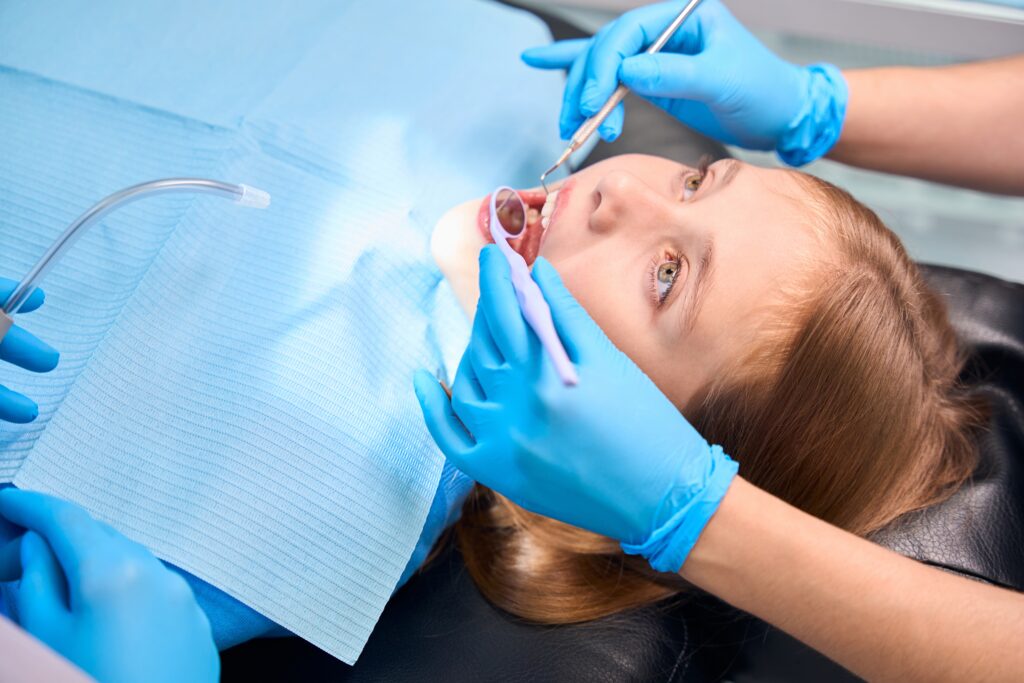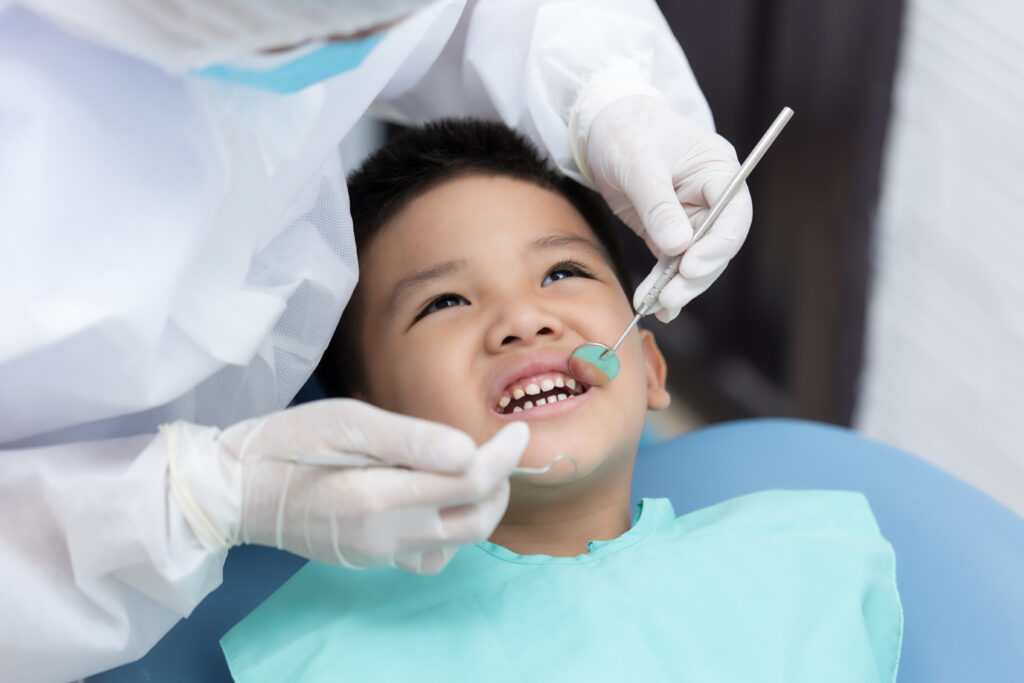Taking your child to the dentist can be a daunting experience for everyone, but having a clear understanding of what pediatric dentistry is and what it does to protect the health of your child’s smile can help everyone feel more confident and relaxed about visiting the dentist.
Keep reading to learn what you need to know before your child’s appointment with a pediatric dentist!

Pediatric dental care is a specialized branch of dentistry focusing on the oral health of young patients from infancy through adolescence. It addresses the unique needs of developing teeth and encompasses both preventive and restorative treatments.
Pediatric dentists undergo additional training to manage children’s specific dental issues and behaviors. They aim to create positive experiences that foster lifelong good oral health habits.
The American Academy of Pediatric Dentistry (AAPD) recommends that children visit the dentist by their first birthday or within six months after their first tooth erupts. Starting dental visits early can help prevent potential problems, establish good oral hygiene habits, and familiarize children with the dental environment, making future visits less intimidating.
Preparation is key to a successful dental visit. Here are some suggestions that can help you and your child get ready to visit the dentist:
Explain the importance of dental visits in a simple and positive way. Ask them about how they feel about visiting the dentist or any fears they may have.
There are many children’s books and videos about visiting the dentist that can help your child understand what to expect. Seeing a favorite character sitting in a dentist’s chair can help them visualize their visit.
Choose a time of day when your child is typically well-rested and in a good mood, usually in the morning or after a nap. Avoid scheduling a visit when they might be hungry and reschedule an appointment if they are not feeling well.
Understanding the process of a pediatric dental appointment can help you feel more prepared and at ease during your child’s visit. Here’s what you can typically expect:

The dentist will thoroughly examine your child’s teeth, gums, and mouth to check for any issues, such as tooth decay or misalignment.
A dental hygienist will clean your child’s teeth, removing any plaque or tartar buildup, which helps to prevent cavities and gum disease.
Their dentist may apply fluoride treatment to strengthen tooth enamel and prevent cavities.
Depending on your child’s age and the date of their last visit, the dentist might take X-rays to get a clearer picture of your child’s dental development and to check for hidden issues.
Pediatric dentists are trained to handle a variety of dental issues that commonly affect children, including:
One of the biggest threats to children’s dental health, tooth decay is often caused by poor oral hygiene and sugary diets. Regular cleanings and dental checkups help protect children’s teeth from tooth decay.
Emerging teeth often cause children pain and discomfort. Pediatric dentists can offer practical solutions for safely easing teething pain.
While comforting to younger children, these habits can affect dental development. Pediatric dentists can offer strategies to help children give up these hard-to-break habits.
Active children are prone to dental injuries. Pediatric dentists know how to handle common emergencies, such as knocked-out or fractured teeth.
Early detection of alignment issues can lead to timely orthodontic interventions and prevent oral health issues caused by misaligned teeth.
Parents or guardians and caregivers play a vital role in maintaining children’s pediatric dental health. Here are some of the best ways to support their dental health:

You can show your child how to properly brush and floss by doing it together. Your enthusiasm and commitment to an oral care routine can help establish a healthy routine.
Children may need help with proper brushing and flossing until they are about seven or eight years old. Ensure they brush for two minutes twice a day and floss daily.
Limit your child’s consumption of sugary snacks and drinks. Instead, encourage a balanced diet rich in fruits, vegetables, and dairy products, which specifically support strong teeth and gums.
Schedule pediatric dental checkups every six months or as your pediatric dentist recommends.
It’s common for children to feel anxious about dental visits. Here are some strategies to help manage their fears:
Praise your child for their calm and bravery at the dentist.
Because children can pick up on their parent’s anxiety, staying calm can be reassuring for your child during their visit.
Allowing your child to bring a favorite toy or blanket to their appointment can help them feel more comfortable.
Start your children off right by selecting a pediatric dentist who is experienced, patient, and good with children is crucial. When choosing a dentist, consider these factors:

Ensure the dentist is board-certified in pediatric dentistry.
A child-friendly office with a welcoming atmosphere and distracting entertainment, like children’s videos, can make visiting the dentist a fun activity for children.
Ask friends, family, and your child’s pediatrician for dentist recommendations. Reading reviews online can also provide insights about providers from the experiences of other parents.
Early dental visits are instrumental in establishing healthy habits and preventing future dental problems. As a parent or caregiver, understanding pediatric dentistry can ensure a lifetime of healthy smiles.
Is it time for your child to have a dental exam? Schedule an appointment at Premier Pediatric Dental in Miami, FL, today!





